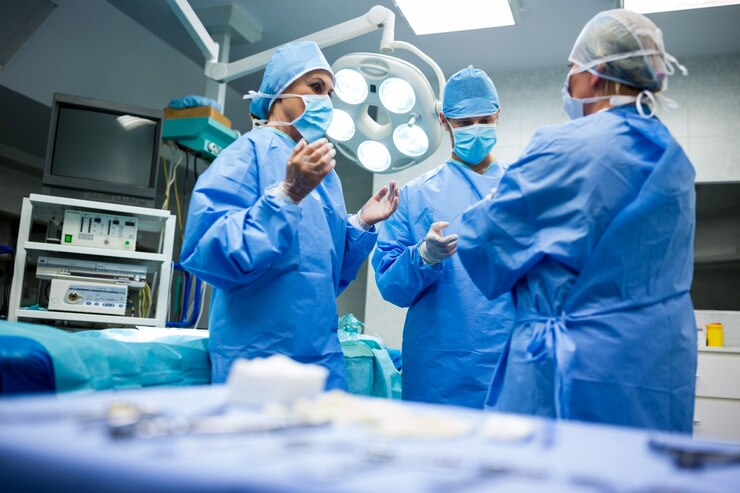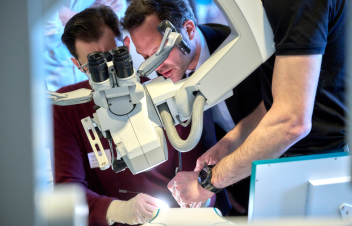The Future of Learning: Our Cutting-Edge Simulation Technologies in Radiology
- surgeonslab1
- Jun 28, 2024
- 4 min read
Simulation has been instrumental in transforming the practice of medicine, providing a safe environment to practice essential skills. SurgeonsLab, one of the leaders in this segment, is striving to develop new methods of interventional radiology simulation training, brain operation simulation, the surgical equipment tracking system, and many other new technologies in simulation training. In this article, the author intensely examines these pioneering technologies and their effects on medical training.

The Evolution of Simulation Training in Radiology
As with most educational tools, simulation training in radiology has advanced a long way since it was first invented. Traditionally, training was conducted on cadavers and simple models, which means that the possibility to revive the procedure, make mistakes, and correct them was severely restricted. The change to simulate was a turning point that allowed us to raise the training up to the level of real-life experiences and repeatability. This has been made possible by the surging simulation systems of SurgeonsLab that imitate actual situations to increase learning and results.
Interventional Radiology Simulation Training
Interventional radiology, abbreviated as IR, can be described as a medical subspecialty that entails the delivery of various therapeutic procedures via image help assistance. High-fidelity simulation fits well in the context of IR because of the intricacy and accuracy implied in the specialty. An additional key benefit of the company’s IR simulation platforms is that they include actual simulated procedures, which let the learners implement the skills in real procedures minus the risks. These platforms have added value involving safety, effectiveness, and mastery of readymade problems based on the difficulties of real-life conditions for practitioners.
The benefits of high-fidelity simulation include Patient safety, whereas the training cost is cut down. This way, trainees can make mistakes that are not associated with the lives of patients and learn from such mistakes. Also, the normality of the training through the use of simulation guarantees that the competence level of the practitioners is acceptable across the organizations. The training applications of SurgeonsLab’s IR simulation platforms also include real-time feedback and resultant performance data, which are also beneficial for the simulation.
Brain Surgery Simulator: A Leap Forward
Neurosurgical operations have long been considered to be one of the most intricate and challenging types of surgery, with strict requirements for precise skills. The above example of the SurgeonsLab Company-developed brain surgery simulator shows that the interactive and effective training tool for neurosurgical procedures is a valuable addition to the modern educational process. Frankly, this simulator recreates all the aspects of the operation, from handling delicate brain tissue to handling various intraoperative emergencies.
What is general about the features and capabilities of the given brain surgery simulator is that they are aimed at additional training. Using the described features and capabilities of the brain surgery simulator, it is possible to optimize the result of the surgery in a positive way. The procedures practiced include various methods that one has to master before getting into an actual treatment of patients. It also has haptic awareness, which, in essence, emulates the feeling of surgery and imaging, which enables one to view the anatomy of the brain.
Surgical Equipment Management through Simulation
Knowledge of the surgical instruments is significant in order to avoid causing discomfort to the patients and time wastage in the operation theatre. The product offering of SurgeonsLab entails training solutions that include the management of equipment in simulations. Such solutions help trainees train how it is going to be in actual surgeries and get acquainted with as many surgical tools and accessories as possible.
The following is the advantages of incorporating surgical equipment management into the training. It should be noted that such trainees can become fast and much more accurate in how they work with surgical instruments, thus cutting on mistakes during surgeries. Also, simulation-based training is helpful in achieving uniformity in equipment handling, as it reduces variations in the techniques displayed by different practitioners or training centers.
Training for equipment management of SurgeonsLab is compatible with numerous types of surgical instruments and the clients may implement it in various situations. It is therefore a significant advantage that no matter the entirety of the trainee’s field, they will undergo a complete course that is directly relevant to their chosen field.
Innovative Simulation Training Approaches
In order to increase the efficiency of training, SurgeonsLab uses a series of simulation training approaches. These methodologies consist of VR, which refers to a completely computer-generated environment; AR, which refers to a real environment containing objects and resources augmented by computers and information derived from MR that involves a blend of the real environment and computer-generated environment. With the help of such solutions, trainees get opportunities to practice in a safe environment and recall the most important information more effectively.
Immersive and interactive training environments offer several advantages over traditional training methods. Trainees can practice in a safe, controlled setting that closely replicates real-life conditions, allowing them to develop and refine their skills without risk to patients. Additionally, these environments provide opportunities for repetitive practice and immediate feedback, further enhancing the learning process.
Key Takeaway
SurgeonsLab is leading the way in the future of learning in radiology, with ongoing advancements in simulation technology poised to revolutionize medical education. Embracing these technologies is crucial for improving patient care and training the next generation of healthcare professionals.







